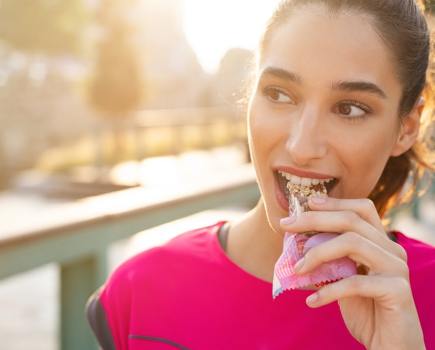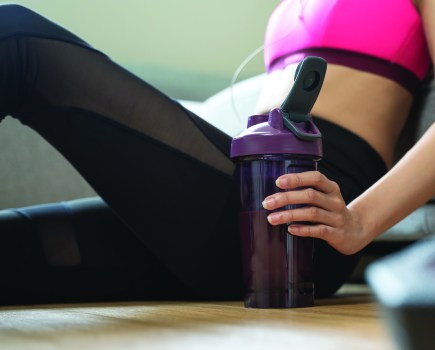Whatever your chosen form of exercise, caffeine can help to boost your performance and help you get the most from your workout. Rob Kemp explains why.
Coffee has become the workout warm-up of choice for growing numbers of cyclists, runners and athletes of all levels. Three out every four athletes will have consumed caffeine before taking part in a training session or competition event according to a Spanish study.
So what makes caffeine so integral to sport and exercise? ‘There’s no doubt that caffeine aids sporting performances,’ insists nutritionist Matt Lovell who has worked with Team GB cycling and a number of Premier League football teams. ‘A meta-analysis of studies suggests anywhere between a 2-16 per cent increase in performance can be credited to caffeine intake.’
Energy boost
The reason why it gives us such a kick is down to its manipulation of the brain’s fatigue receptors. Caffeine has been shown to bind to these receptors – effectively cutting off their communication – while also encouraging the release of the stress hormones (adrenalin and nor-adrenalin) that facilitate our fight or flight response.
‘You can focus a bit harder and go a bit longer using caffeine and everything seems slightly less hard in terms of rate of perceived exertion,’ suggests Lovell. Whilst the coffee itself might be fresh, the use of caffeine to jack up one’s output on the track, in the gym or on the road certainly isn’t. In 1928 the US Olympic Team shipped 1000 cases of Coca-Cola out to the Amsterdam Games – and that wasn’t because they wanted to teach the world to sing in perfect harmony.
Although Coca-Cola’s exact recipe remains a closely guarded secret, one of its known key components is caffeine (from the kolanut). The drinks brand has been a close ally of the US Team and the Olympics ever since. ‘Endurance-wise caffeine helps you run further so delaying fatigue,” reiterates Lovell. ‘You just have to off-set the dehydrating effects of caffeine with adequate fluids and electrolyte intake.’
Perhaps the most prominent sport to be influenced by the fresh approach to coffee and caffeine has been cycling. The boom in bikes, coupled with the craze for coffee have complemented each other and stopping for an espresso is as much a part of the cycling sportive as punctures and chafing – though a lot more welcome.
How to use caffeine
According to Nigel Mitchell, former Team GB cycling performance nutritionist and author of Fuelling The Cycling Revolution it pays to use caffeine sparingly. ‘To get the most beneficial effects of coffee on your cycling for a key event you may want to consider abstaining from it for seven days before hand.’
The outcome could make a serious dent on your ride times too as research into the effects of caffeine on the pace of muscle recovery and energy replenishment has shown. A team from the Garvan Institute of Medical Research in Sydney, Australia found that endurance cyclists who ingested caffeine (8mg per kg of body weight) with carbs had 66 per cent more glycogen in their muscles four hours after finishing intense exercise, compared to when they consumed carbs alone. ‘If you have 66 per cent more fuel for the next day’s training or competition, there’s no question you will go farther or faster,’ said Dr John Hawley, the study’s senior author.
The black stuff drowns out the screaming sinews and tired tendons while helping store glycogen for longer, but it’s not so clear as to why more explosive types, like sprinters might benefit from a pre-workout coffee. ‘Caffeine can help those doing circuits or short aerobic sessions because of the same principle as its endurance benefits,’ suggests Lovell. ‘Higher doses can help you recruit more muscle fibre to lift more weight in the gym.’ But it’s not solely that. There’s the focus factor too.
Mental strength
Athletes, being superstitious creatures of habit, have made coffee part of their training and competition routine and some believe that’s as much for the mental boost as the physical one. ‘It’s entered our fitness psyche to associate the alertness coffee or caffeine provides with the start of exercise,’ suggests personal trainer Sarah Lindsay. ‘If you’re training in the morning, especially, and you can’t face breakfast then coffee can often be the one thing you can tolerate pre workout.’ It’s estimated that caffeine takes approximately 30-minutes to peak within the blood. ‘I use caffeine before training sessions, but guardedly, because the more you use it, the less of response you have to it.’
As well as providing a spike in alertness and giving a workout a decent boost, caffeine also rewires the mind to change our perception of how tough a workout can feel. In Australia, where caffeine seems to be regularly put through its paces, a team of scientists in Queenland’s Griffith University found that taking it had a whole host of plus points for exercisers. When compared to athletes taking a placebo, the caffeine consumers perceived a variety of workout session to be less difficult – they also used more energy, oxidised more fat and ate fewer calories after testing. ‘Coffee can act as an appetite suppressant as well,’ Sarah Lindsay suggests. But’s that not the only way a strong cup of black can help you manage your fat levels.
Weight loss benefit
Caffeine is also credited with helping to maintain a healthy weight though there’s little on the way of hard evidence to say it’s an aid to long-term weight loss. ‘Caffeine releases stress hormones which you need to signal fat burning,’ says Lovell. ‘It’s also a central nervous system stimulant and a strong cup (double espresso) can speed up the body’s metabolism.’ Which will increase calorie burn. ‘But the key is not to use too much for too long as you can always deplete the stress hormone system and get diminishing returns on caffeine use.’
How much caffeine should you take to get the performance benefits?

Alex Higham, co-founder of Exhale Healthy Coffee, vitamin-rich, antioxidant bursting, organic coffee www.exhalecoffee.com, has shared his expert advice:
“The International Society of Sports Nutrition (ISSN) recommend 3-6mg of caffeine per kg of bodyweight, 30-90 minutes prior to exercise to ‘improve endurance exercise capacity’. For a 65kg female, for example, that would be 195mg to 390mg needed to gain the performance benefits of caffeine.
“One cup of Exhale Coffee brewed in a small cafetiere provides 200mg of caffeine which is roughly the minimum recommended dose for the majority of people. We recommend one cup of coffee 60 to 90 minutes before training sessions to allow your body time to metabolise the caffeine. For an extra performance boost you can test taking additional caffeine in the form of caffeine pills, gum or gels, around 15 minutes before a session to bring your total up to 300-400mg or 6mg per kg of bodyweight. This can work wonders on race day, be it half marathon or Hyrox, but just make sure you test it out on a training/run first! You don’t want any nasty surprises mid-session.
“One benefit of taking your caffeine in the form of coffee is that coffee is one of your diet’s richest sources of polyphenols. Polyphenols are bioactive plant compounds which studies have shown can improve both sprint and endurance performance giving you a double performance boost.”







